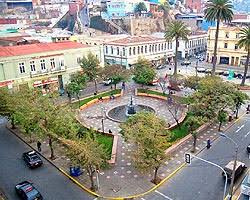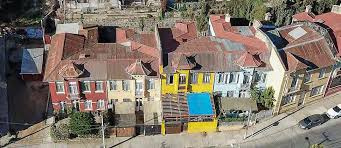How did Valparaíso play a role during the War of the Pacific?

How did Valparaíso play a role during the War of the Pacific?
How did Valparaíso play a role during the War of the Pacific? Valparaíso’s significance during the War of the Pacific (1879-1884) was immense, not only as a strategic military and commercial port, but also as a center of political, economic, and international activity.
Situated on Chile’s coastline, the port city became a vital hub for resources, troops, and maritime logistics throughout the conflict.
The War of the Pacific was fought between Chile, Bolivia, and Peru over control of valuable mineral resources in the Atacama Desert.
Valparaíso, being the most important port in Chile at the time, became central to the nation’s war efforts. With its natural harbor, it was the base for naval operations, the deployment of Chilean troops, and the transportation of critical supplies.
The war not only marked a turning point in Chile’s history but also solidified Valparaíso’s importance in the country’s political and military spheres.
The Port’s Strategic Military Importance
At the outbreak of the War of the Pacific, Valparaíso’s strategic location made it an invaluable asset to Chile. The city’s deep-water port was key to the mobilization of the Chilean Navy.
As the primary naval base for Chile, Valparaíso hosted the nation’s warships, which played a crucial role in controlling the seas.
The port allowed easy access to supply ships and foreign warships that supported Chile’s military efforts. With Valparaíso acting as the home base for the Chilean Navy, it became the hub for all naval operations in the Pacific.
The strategic positioning of the port allowed the Chilean forces to carry out effective naval blockades and maintain supply lines to troops stationed in the northern regions.
This ability to control maritime traffic was crucial to the success of Chile’s military campaigns.
The Naval Blockades and Their Impact
One of Valparaíso’s most significant roles during the war was in implementing naval blockades. Chile’s navy, based in the port, disrupted the Peruvian and Bolivian supply lines, weakening their ability to wage war.
The Chilean Navy, under Admiral Jorge Montt, successfully carried out several critical naval blockades from the port of Valparaíso.
These blockades prevented Bolivia and Peru from receiving reinforcements, supplies, and critical goods, severely impacting their ability to continue fighting.
Valparaíso’s port was not only a logistical hub for Chile’s forces, but it also acted as a point from which the Chilean navy could execute these blockades effectively.
By denying the enemy critical resources, the Chilean forces gained a significant advantage in the war, which ultimately contributed to their victory. This naval control was instrumental in the success of the Chilean war effort.
The Role of Valparaíso in Transport and Logistics
Valparaíso was not just a naval center; it also served as a critical logistical hub during the War of the Pacific. The city’s port facilitated the movement of troops, weapons, and supplies necessary for Chile’s military campaigns.
With a well-developed infrastructure, Valparaíso became the central point for the supply chain. Weapons, ammunition, food, and medical supplies were regularly shipped in from overseas, and troops were dispatched from the port to various battlefronts.
The railway lines connected Valparaíso to Santiago, allowing for quick transportation of troops and supplies into the interior of Chile.
Additionally, international merchants and shipping companies that had ties to Valparaíso also played a role by ensuring that necessary materials were readily available to the Chilean military. The city’s ability to serve as a logistics powerhouse ensured that Chile remained well-equipped throughout the conflict.
International Support and Diplomacy
During the War of the Pacific, Valparaíso’s role as a neutral port for international trade also brought it into contact with foreign powers. The city saw diplomatic activities as countries like the United States and Great Britain got involved.
The international nature of Valparaíso’s trade meant that it was an important location for diplomatic exchanges. While Chile fought against Peru and Bolivia, Valparaíso remained a crucial hub for international trade and diplomacy.
Ships from various countries docked in the port, and foreign officials used the city as a base for negotiations and intelligence gathering.
The Chilean government worked hard to maintain positive relations with foreign powers to prevent them from taking sides or interfering in the war.
The bustling port and its connections to the world stage made Valparaíso a focal point for global politics during this tumultuous period.
The Effects of the War on Valparaíso’s Economy
While the War of the Pacific was a victory for Chile, it came at a significant cost to Valparaíso’s economy. Although the city played a vital role in military logistics, it suffered economically from blockades and the war’s disruption.
The war placed a heavy strain on Valparaíso’s economy, as much of the region’s trade was disrupted by naval blockades and the redirection of resources to the war effort.
The cost of maintaining a war fleet and securing supplies drained the city’s financial resources. At the same time, the war created instability in trade routes, causing foreign trade to slow.
However, the aftermath of the war saw a period of economic boom as Valparaíso recovered, due in part to the newfound control over nitrate-rich territories in the north. The prosperity from mining and trade helped Valparaíso regain its position as the economic heart of Chile.
The Chilean Navy’s Victory and Valparaíso’s Legacy
The culmination of the War of the Pacific saw Chile’s victory and the expansion of its territory. Valparaíso, as the hub of the Chilean Navy during the war, became an emblem of national pride and military success.
The Chilean Navy’s victory, supported by the strategic use of Valparaíso’s port, was one of the most significant aspects of the conflict.
The city’s role in the naval blockades and its function as a base for naval operations were critical to the success of the Chilean forces.
The pride associated with the Navy’s achievements was reflected in Valparaíso’s position as a symbol of national strength.
After the war, Valparaíso continued to thrive as a center for Chilean naval activities, solidifying its legacy as an essential military and cultural landmark.
Post-War Impact on Valparaíso’s Port
The war left an indelible mark on Valparaíso’s port. Though the city’s role as a military stronghold waned over time, it remained a symbol of Chile’s maritime power. The port continued to develop.
Following the war, Valparaíso continued to play an important role in trade, though its dominance began to decline with the opening of other ports such as San Antonio.
The infrastructure improvements and investments made during the war in Valparaíso’s port ensured that it remained an important center for Chile’s commercial shipping.





Leave a Reply